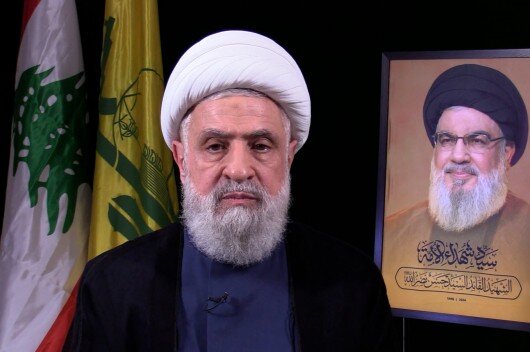Hezbollah ready for a long war

TEHRAN- Hezbollah’s newly-elected Secretary-General Sheikh Naim Qassem has vowed to follow in the footsteps of his predecessor who was assassinated by Israel more than a month ago.
Delivering his first speech as the Hezbollah chief on Wednesday, Qassem said the Lebanese resistance group will keep fighting a war with Israel while adhering to the same strategy laid out by Sayyed Hassan Nasrallah.
Qassem was elected as Hezbollah’s leader on Tuesday, succeeding Nasrallah who was martyred in an Israeli airstrike on Beirut’s suburb of Dahieh on September 27.
US media acknowledged that Israel used American-made 900kg (2,000-pound) bombs in the strike that killed Nasrallah and levelled residential buildings in Dahieh.
Hezbollah also announced last week that Sayyed Hashem Safieddine, the head of the movement’s Executive Council, was martyred in an Israeli airstrike on Beirut in early October.
“My agenda is to follow Nasrallah’s agenda in all aspects,” Qassem said, adding, “We will continue our war plan.”
Stressing that Hezbollah’s capabilities are great and compatible with a long war, he promised to inflict “absolute defeat” on Israel.
Qassem noted that Nasrallah was like a brother to him and Safieddine was a man upon whom Nasrallah could heavily rely on.
He further touched upon the West’s role in enabling Israel’s warmongering, saying the movement is facing an “American, European and global war to put an end to our resistance.”
Hezbollah’s support for Gaza
Qassem also referred to Israel’s genocidal war on Gaza, saying Hezbollah will continue to support Palestinian people in the besieged territory and “confront the danger Israel poses for the whole region.”
Hezbollah and Israel began trading fire a day after Prime Minister Benjamin Netanyahu declared war on Gaza on October 7, 2023. Netanyahu issued the order after Hamas conducted Operation Al-Aqsa Storm, a surprise military attack in southern Israel which dealt a severe blow to the regime.
Hezbollah has carried out attacks on Israel in solidarity with Palestinians in Gaza.
Tens of thousands of people have been displaced in northern Israel and southern Lebanon amid the exchanges of fire between Israel and Hezbollah over the course of the Gaza war which has so far left more than 43,000 Palestinian people dead.
Israel launched a massive bombing campaign in Lebanon on September 23 this year which was later followed by a ground invasion of the country’s south a week later.
Israel has killed about 2,800 people in Lebanon and injured more than 12,700 others since October last year.
Countering aggression
In response to Israel’s air and ground assaults on Lebanon, Hezbollah has intensified its retaliatory attacks.
The movement has hit strategic military sites deep inside Israel. It has targeted these facilities in Tel Aviv and Haifa.
Hezbollah has also struck serious blows to the regime’s military on the battlefield in southern Lebanon.
The Israeli army has acknowledged that 33 soldiers have been killed in southern Lebanon this October.
Israeli opposition leader Yair Lapid said Monday that around 12,000 Israeli soldiers have been either injured or killed since the beginning of the Israeli genocidal war on the Gaza Strip, which has expanded to Lebanon.
“Eleven thousand soldiers were injured and 890 others killed,” Lapid told Israeli Channel 12, underscoring that the number of dead and injured soldiers in the Israeli army will continue to increase if Netanyahu “doesn’t do anything.”
Lapid emphasized that the military conceals the true casualty numbers.
Israel exhausted
More than a year into the war of genocide on Gaza, the Israeli army’s reservists are exhausted and it is struggling to recruit soldiers, according to AFP.
Periods of reserve duty have been extended, and some reservists complain they are unable to continue their normal lives.
According to the Israeli army, some 300,000 reservists have been called up since the start of the Gaza war, 18 percent of them men over 40 who should have been exempted.
As Israel is running out of soldiers, Hezbollah has put up stiff resistance on the battlefield.
Hezbollah’s military capabilities, in particular its drones, have become Israel’s recurrent nightmare. On October 19, a Hezbollah drone hit Netanyahu’s residence in Caesarea in northern Israel spreading panic in Tel Aviv and beyond.
Such attacks indicate that the decapitation of Hezbollah leadership has been ineffective.
Over the past decades, the movement has become stronger although Israel has assassinated its leaders and commanders.
Qassem’s first speech has also made it clear that such assassinations have failed to undermine the indomitable will of Lebanese people in defending their country against Israel’s aggression.